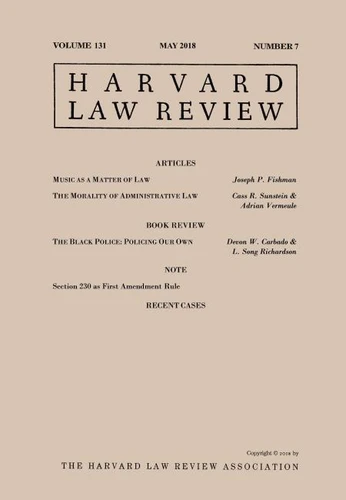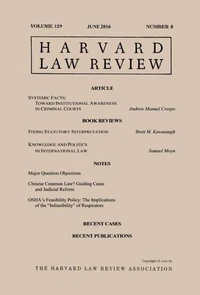Harvard Law Review: Volume 131, Number 7 - May 2018
Par :Formats :
Disponible dans votre compte client Decitre ou Furet du Nord dès validation de votre commande. Le format ePub est :
- Compatible avec une lecture sur My Vivlio (smartphone, tablette, ordinateur)
- Compatible avec une lecture sur liseuses Vivlio
- Pour les liseuses autres que Vivlio, vous devez utiliser le logiciel Adobe Digital Edition. Non compatible avec la lecture sur les liseuses Kindle, Remarkable et Sony
 , qui est-ce ?
, qui est-ce ?Notre partenaire de plateforme de lecture numérique où vous retrouverez l'ensemble de vos ebooks gratuitement
Pour en savoir plus sur nos ebooks, consultez notre aide en ligne ici
- FormatePub
- ISBN978-1-61027-760-0
- EAN9781610277600
- Date de parution08/05/2018
- Protection num.pas de protection
- Infos supplémentairesepub
- ÉditeurMark Childress
Résumé
The contents of the May 2018 issue (Number 7) include:* Article, "Music as a Matter of Law, " by Joseph P. Fishman* Article, "The Morality of Administrative Law, " by Cass R. Sunstein & Adrian Vermeule* Book Review, "The Black Police: Policing Our Own, " by Devon W. Carbado & L. Song Richardson* Note, "Section 230 as First Amendment Rule"In addition, the issue features extensive student commentary on Recent Cases, including such subjects as: a recent ruling that bystanders have a First Amendment right to record police but granting qualified immunity to police officers involved; whether a local (Massachusetts) drone ordinance is preempted by FAA regulation; whether there is irreparable injury from a state's (Alabama's) lack of notice to people with felony convictions upon their re-enfranchisement; whether a state law (from South Dakota) is unconstitutional in requiring internet retailers without a physical presence in the state to remit sales tax (an issue currently before the U.
S. Supreme Court); estate planning and digital inheritance, and whether personal representatives may provide lawful consent for the release of a decedent's emails; and whether a district court may use the policy of public understanding of the opioid epidemic to deny a plea bargain.
S. Supreme Court); estate planning and digital inheritance, and whether personal representatives may provide lawful consent for the release of a decedent's emails; and whether a district court may use the policy of public understanding of the opioid epidemic to deny a plea bargain.
The contents of the May 2018 issue (Number 7) include:* Article, "Music as a Matter of Law, " by Joseph P. Fishman* Article, "The Morality of Administrative Law, " by Cass R. Sunstein & Adrian Vermeule* Book Review, "The Black Police: Policing Our Own, " by Devon W. Carbado & L. Song Richardson* Note, "Section 230 as First Amendment Rule"In addition, the issue features extensive student commentary on Recent Cases, including such subjects as: a recent ruling that bystanders have a First Amendment right to record police but granting qualified immunity to police officers involved; whether a local (Massachusetts) drone ordinance is preempted by FAA regulation; whether there is irreparable injury from a state's (Alabama's) lack of notice to people with felony convictions upon their re-enfranchisement; whether a state law (from South Dakota) is unconstitutional in requiring internet retailers without a physical presence in the state to remit sales tax (an issue currently before the U.
S. Supreme Court); estate planning and digital inheritance, and whether personal representatives may provide lawful consent for the release of a decedent's emails; and whether a district court may use the policy of public understanding of the opioid epidemic to deny a plea bargain.
S. Supreme Court); estate planning and digital inheritance, and whether personal representatives may provide lawful consent for the release of a decedent's emails; and whether a district court may use the policy of public understanding of the opioid epidemic to deny a plea bargain.






















